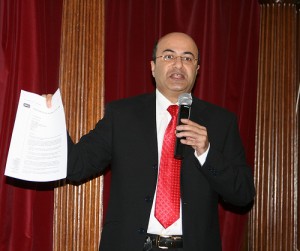 The recent newswire story proclaimed “Sorry no longer the hardest word in Ontario”. Ontario passed legislation this month that will allow people to say sorry without fear of having it turned against them in court. Under the new rules, apologies can’t be used as an admission of fault or liability and won’t affect someone’s insurance coverage. The governing Liberals say fewer people apologize because they’re afraid it could come back to haunt them if they are sued. Ontario joins 3 other Canadian provinces, and over 30 States, that have passed similar legislation.
The recent newswire story proclaimed “Sorry no longer the hardest word in Ontario”. Ontario passed legislation this month that will allow people to say sorry without fear of having it turned against them in court. Under the new rules, apologies can’t be used as an admission of fault or liability and won’t affect someone’s insurance coverage. The governing Liberals say fewer people apologize because they’re afraid it could come back to haunt them if they are sued. Ontario joins 3 other Canadian provinces, and over 30 States, that have passed similar legislation.
There is power in apology. Apology can move people to a new space, leading to constructive dialogue and collaborative action. I know this as a mediator. I’ve seen apology move the disputants off their positions; make it feel safe for them to work together to resolve the issues-at-hand. And yet, heartfelt acceptance of the apology can depend on whether the apology offered was a true apology or just sympathy for your situation.
A couple of years ago I attended a workshop dedicated to apologies, delivered by Janet Bavelas, Professor of Psychology, University of Victoria. What I remember most about that workshop is the many shades of apology, that there are apologies, and then there are true apologies, where the person takes responsibility for the hurtful act, naming him- or herself as the agent of the offence and describing equally clearly what he or she did. Anything other than a true apology is what Bavelas calls a non-apology. Figure 1 Sympathy vs. Apology in the PDF version of her academic document found at http://csrs.uvic.ca/publications/occasional/apologies.php summarizes the differences between real and non- apologies. The document was published as an analysis of the formal apologies given by Canadian churches for past harms done to aboriginal people.
To summarize, true apology starts with I’m sorry (or equivalent) and includes a statement of responsibility. When someone says I’m sorry that you were fired , had an accident, or are feeling bad, he or she is expressing sympathy. But if the speaker is the one who did the firing, caused the accident, or made the person feel bad, then that phrasing is inappropriate because it is only sympathy, not an apology. This may be the reason why making a true apology is so difficult – just ask some CEOs of large financial corporations.
While governments are starting to recognize the power of apology, what are other organizations doing? At the operational level, how does an organization formally create a safe place to apologize? What story can you share on this front?
If you enjoyed this post, please consider leaving a comment or subscribing to the feed to have future articles delivered to your feed reader.
Photo credit: gangotricampaign

I once worked as a shuttle driver for an airport service. During training, i was told NEVER apologize to another driver if you’ve been involved in a collision as it is an admission of guilt. The first week at the airport, a driver of a beautiful black cadillac swung open his door as my shuttle, full of customers, drove by. as soon as he got out, he profusely apologized to me, saying it was his fault, and the 3 airport policemen recorded it as such. His apology, in front of all my ‘customers’ was a gift to me, a newbie shuttle driver. His front door was wrecked, he could have lost a leg and his company probably fired or put him on probation. But his apology helped his clients, the police, my customers and self helped move us all beyond anger to helping the guy get on with his mistake and life. It still positively affects me to this day. Your article’s point is well taken.
Rosemarie, thank you for sharing your story. Your personal experience is an excellent example of the positive potential an apology holds; e.g., its’ impact can extend well beyond the time period when the actually apology was given.